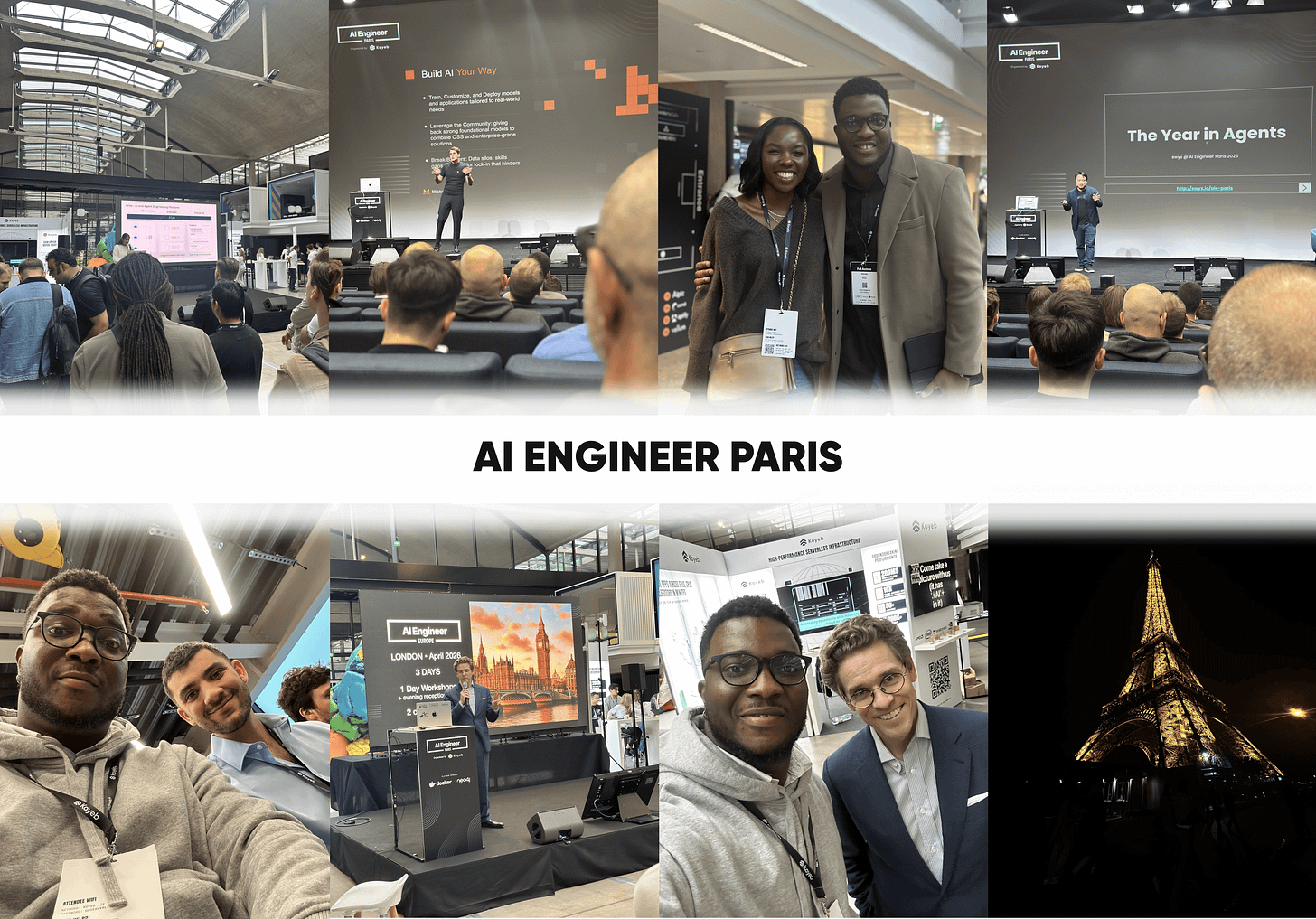AI Engineer Paris 2025 Recap
Through the Lens of Trustworthy AI
Just last month, on the 23rd-24th of September 2025, the atmosphere at the AI Engineer (AIE) Paris Expo was electric. This was the first edition outside the US, hosted at STATION F and organised with Koyeb. The event carried a very pragmatic energy, with engineers focused on building and deploying the next generation of AI agents, tools, and infrastructure. But beyond the demos and keynotes, as I moved between the sessions I attended, a deeper personal theme emerged: the future isn’t just about building more intelligent AI, it’s about building more trustworthy AI.
My Key Takeaways
→ Open Source as the Foundation of Trust
Lélio Renard Lavaud (Mistral) reminded us that adoption at enterprise scale hinges on openness. By sidestepping vendor lock-in and surfacing transparency, open models create the reliability businesses demand. Laurent Sifre (H Company) echoed this, framing open-source “bricks” as the future scaffolding for AI innovation.
Trustworthy AI starts with open foundations, not closed walls.
→ Security and Safety by Design
Jesús Espino (Ona) and Martin Woodward (GitHub) emphasised that trust cannot exist without security. Isolation, auditability, and reproducibility aren’t optional; they are essential, especially in regulated environments. Safe AI deployment protects both users and businesses, ensuring that agentic workflows remain reliable even under high stakes.
Trustworthy AI requires safety and security as core principles, not afterthoughts.
→ Learning from Failure: Context, State, and Infrastructure
Thomas Schmidt (Metabase) and Rémi Louf (.txt) reminded us that agents still hallucinate metrics, misreport outputs, and occasionally break fundamental interactions. Emil Eifrem (Neo4j) and talks from Spotify and Shopify highlighted the root cause: poor state and context management. Without clear context and robust infrastructure, agents misstep or stall. Yann Leger (Koyeb) emphasised that resilient, heterogeneous, agent-ready systems are essential to turn these failures into trustworthy performance.
Trust begins by confronting failure and building the context and infrastructure that prevent it.
→ Evaluation and Trust in AI Behaviour
If you can’t measure it, you can’t trust it. Pierre Burgy (Strapi), SallyAnn DeLucia (Arize AI), and Srilakshmi Chavali highlighted a hard truth: static benchmarks often fail to reflect real-world reliability. Instead, emerging frameworks focus on session-level monitoring, conversations, and user “vibe” to systematically evaluate AI behaviour. Continuous feedback loops enable agents to learn and improve transparently, turning evaluation into a true measure of trustworthiness.
Trust is earned through continuous, measurable evaluation, not just static metrics.
→ Efficiency, Sustainability, and Scale
From Bertrand Charpentier’s deep dive into compression techniques to Steeve Morin’s sparse attention on CPUs, engineers are proving that trustworthy AI must also be efficient AI. Sustainability isn’t a side goal. It’s part of reliability, cost-effectiveness, and accessibility.
Trust is not just about correctness, it’s about efficiency and responsibility at scale.
→ Agents Moving from Promise to Practice
The event showed the inflexion point where agents stopped being hype and started showing their promise.
Codebase rewriting at scale (Spotify)
Senior-level AI code review (Graphite)
Agent swarms for refactoring (All Hands AI)
Multi-agent orchestration (Docker)
Each showed a vision where agents aren’t assistants, they’re teammates.
Agents are no longer experiments; they’re workflows.
From the sessions I attended, my strongest impression is that the future of AI won’t be built on hype, but on a foundation of trust. The conference made it clear that trust is the result of a responsible engineering mindset.
Looking Forward
The AI Engineer community is just getting started, as the founders said, and from my own experience, you won’t want to miss what’s next. Mark your calendars and secure your tickets:
AI Engineer Code Summit | November 20–22, New York, NY
AI Engineer Europe | April 7–10, London, UK
AI Engineer World’s Fair 2026 | June 30–July 2, San Francisco, CA
I look forward to seeing you in the next one, know more.



